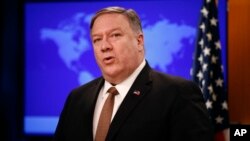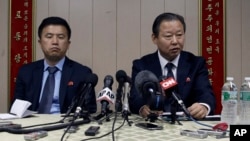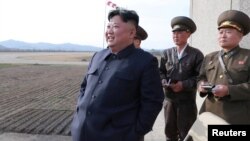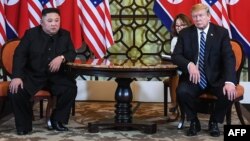Juhyun Lee and Cindy Saine contributed to this report.
SEOUL — North Korea is demanding that U.S. Secretary of State Mike Pompeo no longer take part in any further talks involving its nuclear weapons program.
Kwon Jong Gun, a senior official in the North’s foreign ministry, says Pyongyang wants someone who is “more careful and mature in communicating,” according to a report by the official KCNA news agency.
When asked about the development, a State Department spokesperson said "The United States remains ready to engage North Korea in a constructive negotiation."
On Wednesday, North Korea announced that it had tested a new “tactical guided weapon,” the latest display of Pyongyang's military capabilities.
KCNA said Kim Jong Un supervised and guided the Wednesday test, calling it an operation of “very weighty significance.”
The KCNA report did not elaborate on the type of weapon tested, but the phrase “tactical” suggests it is not a ballistic missile.
Still, the test could be seen as a warning to the United States, amid an impasse in talks over North Korea’s nuclear program.
“Kim is trying to make a statement to the Trump administration that his military potential is growing by the day, and that his regime is becoming frustrated with Washington’s lack of flexibility in recent negotiations,” says Harry Kazianis, director of Korean Studies at the Center for the National Interest.
A U.S. military official said late Wednesday the Pentagon is aware of the reported test, but has no further comment.
North Korea has not carried out a nuclear or long-range missile test for well over a year, since Kim began talks with the United States and South Korea.
Instead, the North has carried out smaller provocations. In November, Kim oversaw the test of what KCNA also referred to as a newly developed “high-tech tactical weapon.” U.S. officials later played down the significance of that test.
Stalled talks
Nuclear negotiations between the United States and North Korea have been stalled since a February meeting in Hanoi between Kim and U.S. President Donald Trump ended in no deal.
Trump wants Kim to completely abandon his nuclear weapons program in exchange for sanctions relief. Kim has only offered limited steps toward denuclearization. Kwon Jong Gun warned Thursday that “no one can predict the situation” on the Korean Peninsula if the United States does not give up “the root cause” that led the North to seek nuclear weapons.
Last week, Kim said he was open to another summit with Trump, but warned he would only give the U.S. until the end of the year to change its “approach” to the negotiations.
A North Korean official said last month that Kim is considering resuming missile tests and pulling out of the talks with the United States.
What did North Korea test?
It isn’t clear the weapon North Korea tested Wednesday was even a missile KCNA referred only to a “tactical guided weapon.”
Regardless, the weapon doesn’t appear to have been nuclear-capable, since usually such arms are referred to as “strategic,” rather than “tactical.”
“The design indexes of the tactical guided weapon, whose advantages are appreciated for the peculiar mode of guiding flight and the load of a powerful warhead, were perfectly verified at the test-fire conducted in various modes of firing at different targets,” KCNA said.
“It is likely to be a new cruise missile” with a limited range, says Kim Dong-yub, a North Korea specialist at Seoul’s Institute for Far Eastern Studies. “If it is a cruise missile, then it has no relevance with the current sanctions. Existing sanctions only apply to ballistic missiles.”
Increase in provocations?
Even though North Korea’s latest test is not likely a ballistic missile, it is still meant to send a message to Trump, said Vipin Narang, a nuclear expert and professor at the Massachusetts Institute of Technology.
The test amounts to “calibrated signaling to remind us where things can go if we don’t moderate our negotiating position,” Narang says.
It isn’t clear how Trump will respond to North Korea’s latest test. Earlier this week, Trump said talks with North Korea “are moving along just perfectly.”
Meanwhile, commercial satellite photos from last week showed increased activity at North Korea’s main nuclear site, according to a U.S. research organization.
The Center for Strategic and International Studies noted the presence of five specialized railcars at the Yongbyon nuclear complex.
“In the past, these specialized railcars appear to have been associated with the movement of radioactive material or reprocessing campaigns,” the report said.
Also Wednesday, Kim carried out a public inspection of a military unit for the first time in several months, reviewing a flight exercise of the Korean People’s Army.
Kim is expected to meet next week with Russian President Vladimir Putin. With U.S. negotiations stalled, Kim is likely to push Putin to provide economic aid and sanctions relief.




